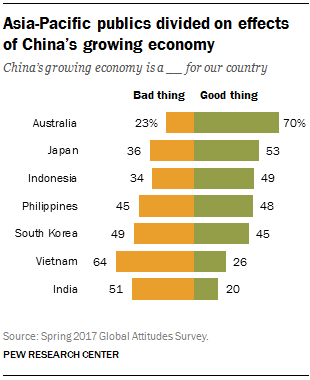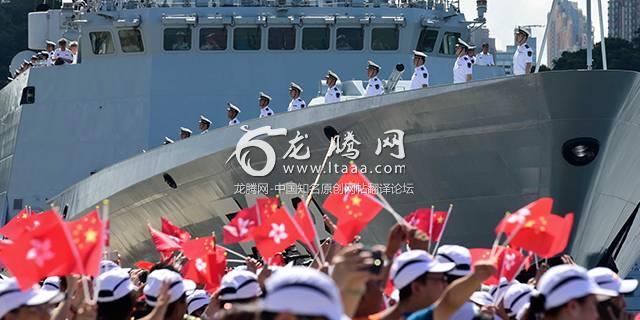皮尤:亚太地区民众怎么看中国? [美国媒体]
对于那些想要理清这个世界上人口最多的国家的政策变化的人来说,本周的会议,将让他们得以近距离一窥。会议将会回顾过去5年的工作,包括中国的外交政策,以及与邻国的关系。皮尤研究中心全球态度调查了中国在亚太地区的形象,来看看中国的邻居们是怎么看待中国的。
How people in Asia-Pacific view China
亚太地区民众怎么看中国?
How people in Asia-Pacific view China
This week, China convenes its 19th National Congress, a gathering closely watched by those seeking to understand power shifts and policy changes within the world’s most populous country. The meeting will feature a review of the Communist Party’s work over the past five years, including China’s foreign policy and its relations with its neighbors. Pew Research Center’s 2017 Global Attitudes Survey explored China’s image in the Asia-Pacific region. Here are four key findings about how China is viewed by its neighbors:
对于那些想要理清这个世界上人口最多的国家的政策变化的人来说,本周的会议,将让他们得以近距离一窥。会议将会回顾过去5年的工作,包括中国的外交政策,以及与邻国的关系。皮尤研究中心全球态度调查了中国在亚太地区的形象,来看看中国的邻居们是怎么看待中国的。
1 Views of China’s economic growth are mixed across the Asia-Pacific region. There is little consensus among the seven countries surveyed there about whether China’s growing economy is more of a good thing or a bad thing for their country. Three say the former, two the latter and two are nearly evenly split. Australians are most positive about China’s economic growth; by a three-to-one margin, more people say China’s economic growth is good for Australia than bad. In contrast, only 20% of Indians see China’s economic rise as a good thing for their country. The Asia-Pacific region is also one of the regions where most people name the U.S., not China, as the top global economic power.
1 亚太地区对中国的经济增长态度复杂。对中国经济增长带来的好坏意见不一。三个国家认为好处大于坏处,两个国家意见相反,另外两个意见较为平衡。澳大利亚是对中国经济增长最为正面的国家,更多的人认为中国经济增长给澳大利亚带来的好处大于坏处。相比之下,只有20%的印度人认为中国崛起对他们国家来说是好事。亚太地区也是最多人认为美国,而不是中国是全球最大经济体的地区。
2 Most in the region worry about China’s growing military power. China’s official military budget grew by about 9% per year over the past decade, and few of its neighbors appear to welcome the increase. In South Korea, Japan and Vietnam – countries actively engaged in disputes with China over military deployments or territory in the East and South China seas – nine-in-ten or more think China’s growing military power is a bad thing for their country. In India, even before a recent border dispute in the Himalayas, people had a negative view of Beijing by a more than three-to-one margin.
2该地区大多数民众对中国军力的增长感到担忧。在过去十年,中国官方军事预算年均增长约9%,很少有邻居欢迎这种增长。韩国,日本和越南,——这些国家都与中国存在纠纷——要么是军事部署,要不是在东海或南中国海存在领土纠纷。这些国家90%以上的民众认为中国军力增长对他们国家来说是坏事。印度,甚至在最近的喜马拉雅边境争端之前,对中国持消极态度的民众就超过了三比一。
3 Although China’s power and influence is not seen as a top threat globally, many in Asia-Pacific countries see it a key concern. Outside the region, a median of 27% see China’s power and influence as a major threat to their country. But among the seven Asia-Pacific countries surveyed, a median of 47% see it as a major threat. South Koreans and Vietnamese even rate China’s power and influence as the top threat facing their nations. Concerns about China also outpace concerns about the United States across the region; a median of 35% say U.S. power and influence is a major threat to their country.
尽管中国的实力和影响力在全球范围内并不被认为是最大威胁,但被很多亚太国家视为关键担忧。在地区外,视中国实力和影响力为主要威胁的中位数比例为27%,但在这7个国家亚太国家中,这一比例上升至47%,韩国民众和越南民众视中国实力和影响力为其国家需要面对的最大威胁。在该地区对中国的担忧超过了对美国的担忧。35%的中位数比例认为美国是他们国家的主要威胁。
版权声明
我们致力于传递世界各地老百姓最真实、最直接、最详尽的对中国的看法
【版权与免责声明】如发现内容存在版权问题,烦请提供相关信息发邮件,
我们将及时沟通与处理。本站内容除非来源注明五毛网,否则均为网友转载,涉及言论、版权与本站无关。
本文仅代表作者观点,不代表本站立场。
本文来自网络,如有侵权及时联系本网站。
图文文章RECOMMEND
热门文章HOT NEWS
-
1
Why do most people who have a positive view of China have been to ...
- 2
- 3
- 4
- 5
- 6
- 7
- 8
- 9
- 10
推荐文章HOT NEWS
-
1
Why do most people who have a positive view of China have been to ...
- 2
- 3
- 4
- 5
- 6
- 7
- 8
- 9
- 10











